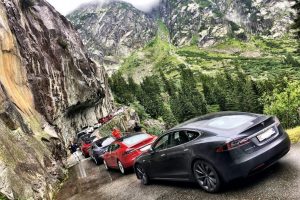On Friday, the Tesla stock price closed at $663.90 — that was down 6.43% for the day. The Tesla brand has seen a soaring and often upsetting swing over 52 weeks, with a high of $1243.49 per share as well as the downward spiral this past week.
Tesla CEO Elon Musk’s public demeanor seems to be negatively impacting the stock. His professed bid to acquire Twitter has caused financial turmoil in both companies. Other factors as well have contributed to Tesla’s poor recent showing. For example, accusations about Musk’s personal behavior might made many stockholders uncomfortable. The Tesla Shanghai factory reduced output due to the Covid-19 shutdown there, with multiple Wall Street analysts warning about the country’s disruptions weighing on Tesla results. Tesla’s removal from the ESG index at S&P due to alleged labor and vehicle safety concerns sparked outbursts from Musk about hypocrisy. All of these — and more — have had negative effects on the Tesla brand.
Investors are cringing.
It’s certainly not the first time that Tesla’s stock valuation has been volatile. A question remains. Is the Tesla product so remarkable and resilient that it can withstand these forces?
Also note that the overall stock market is down considerably in the face of rising interest rates and other macro factors.
(Note: I hold a few shares of Tesla stock. This article is in no way meant as financial advice. I’m an educator and researcher by career.)
ARK Invest founder Cathie Wood is a long-time Tesla bull who projects a 2026 price target for the electric vehicle maker’s shares at $4,600. Tesla, though, isn’t the largest holding in ARK Innovation ETF anymore.
The Motley Fool says that, even with the stock-based distractions, Tesla as a company has become an “absolute powerhouse.” The company reported a solid first quarter and set ambitious long-term goals, exciting investors. Because revenue grew faster than production, Tesla is generating better margins than ever on every vehicle it produces. This revenue growth trickles down to the bottom line, as quarterly net income rose 658% year over year. The Fool concludes that “today could be one of the best opportunities to buy Tesla stock in a long time. Don’t worry about getting the absolute lowest price; a sentiment turnaround could come at any time and cause a rapid stock rise.”
The New York Times, however, writes that investors are reassessing the premise that justified Tesla’s “astronomical” stock price and made its founder, Elon Musk, the richest person in the world. Tesla’s $1 trillion valuation made sense, they say, only if investors believed the electric car company was on a path to dominate the auto industry the way Apple rules smartphone profits or Amazon commands online retailing.
Will the Tesla brand withstand the turmoil swirling around it and prove it can dominate the auto industry?
Can Tesla Branding Prevail in Tough Market Times?
Tesla buyers believe in the Tesla brand.
In 2016, Tesla published its “Master Plan, Part Deux,” which allowed its customer base to envision its sustainability pathway as integral to the Tesla identity. The Plan invited customers to be part of that process, to be personally involved in the journey, and to want to own the products that were so visionary. Customers endorsed Tesla’s evolution of “computers on wheels.” They admired the company approach of focusing so heavily on the pace of innovation. They valued the explicit company plans to mitigate emissions and tackle environmental concerns.
Tesla has led the way to all-electric transportation, and it continues to do so, with the field of competitors making bold claims that they will surpass Tesla in market share but with little actual likelihood for catching Tesla anytime soon.
Tesla also manages and controls the whole customer experience throughout the sales cycle. It doesn’t rely on dealers or franchises but uses the allure of its products to inspire word-of-mouth and media interest. Without a traditional print and media advertising arm, Tesla has relied on Musk to address concerns over its finances, its ability to build cars at scale, and its delivery delays — normally through social media.
The Model Y has been a clear EV leader since its release two years ago; the pace of the Model Y’s growth is remarkable and a testimonial to consumer endorsement for the all-electric crossover.
The absolute earliest we’ll see the Cybertruck is late 2022 and the Semi in 2023, and that is due to high demand for Tesla vehicles combined with limited supply of EV batteries and some of the metals in them.
Tesla has set goals for in-house battery production to halve the costs of the most expensive part of an EV. Tesla’s 4680 lithium-ion batteries — with 46-millimeter diameter and 80-millimeter length — hold about 5 times the energy of its current, smaller 2170 cells. Tesla can use a smaller number of new cells for the same energy and driving range, reducing costs.
The 2021 Tesla Impact Report offered many insights into the company’s governance. Within that narrative was an explanation of the Tesla Board’s responsibilities and its task to continuously evaluate its corporate governance structure, practices, and policies. It stated that the Board weighs stakeholder feedback, including proposals generated at annual meetings.
The JD Power Automotive Performance, Execution and Layout (APEAL) Study examines new-vehicle owners’ assessments of their experiences with their new vehicle after 90 days of ownership. The study data provides insight on experiences with design, performance, safety, usability, comfort, perceived quality, and other factors. In 2021, the unofficial score of 893 for the Tesla brand was higher than any other brand, which the Study called “impressive.”
APEAL is based on more than 40 vehicle attributes in 10 experience groups:
- Walking up to your vehicle
- Setting up and starting your vehicle
- Getting in and out of the vehicle
- Your vehicle’s interior
- Your vehicle’s powertrain
- Your vehicle’s driving feel
- Your vehicle keeping you safe
- Using the infotainment system
- Your vehicle’s driving comfort
- Fuel usage
The APEAL Study measures an owner’s emotional attachment to their new vehicle and in what areas that vehicle may not be delivering on all of the positive experiences that were hoped for. Understanding this is just as valuable to automakers as knowing about quality issues and owner acceptance of new technologies. Tesla’s high scores indicate that the Tesla brand is not that affected by the social media whirlwind.
Maybe it’s the stock price that’s not separate, though.
Stock Price Plunges Continue to Plague the Tesla Brand
Tesla accepts that the company is often a one-person show, and Musk frequently uses Twitter to react to slights and perceived affronts. He has the capacity to use his platform as the world’s richest person to spur solidarity and corporate social responsibility, to inspire those of us bogged down in the everyday doldrums to breathe in the inspired air of infinite, sustainable energy. He hasn’t chosen that route.
On the other hand, the Tesla management team expects to grow its vehicle deliveries by 50% annually over multiple years. Tesla delivered 310,048 electric vehicles in the first quarter of 2022.
The public face of Tesla’s promise isn’t enough for some stockholders, however. Billionaire Leo Koguan, who claims to be the third-largest individual shareholder of Tesla stock, is calling on the carmaker to announce a $15 billion stock buyback as the company’s share price continues to fall. In a tweet to Martin Viecha, Tesla’s senior director of investor relations, Koguan said the company should immediately announce it plans to buy back $5 billion of Tesla shares this year and $10 billion next year. He added that Tesla should use its free cashflow to fund the buyback and that it shouldn’t affect its existing $18 billion cash reserves.
A stock buyback, when a public company uses cash to buy shares of its own on the open market, is a method that firms use to try to return capital to shareholders.
Wedbush analyst and Tesla bull Dan Ives told CNBC that Musk’s plan to buy Twitter has been a “massive overhang” on Tesla’s stock. Ives, who indicates that he has followed Musk for decades, claims that Musk has incurred a “black eye” in the last few weeks. “The way he’s handled this, I believe has been unconscionable,” Ives said, adding it’s “left a bit of a stain” on Tesla’s stock.





